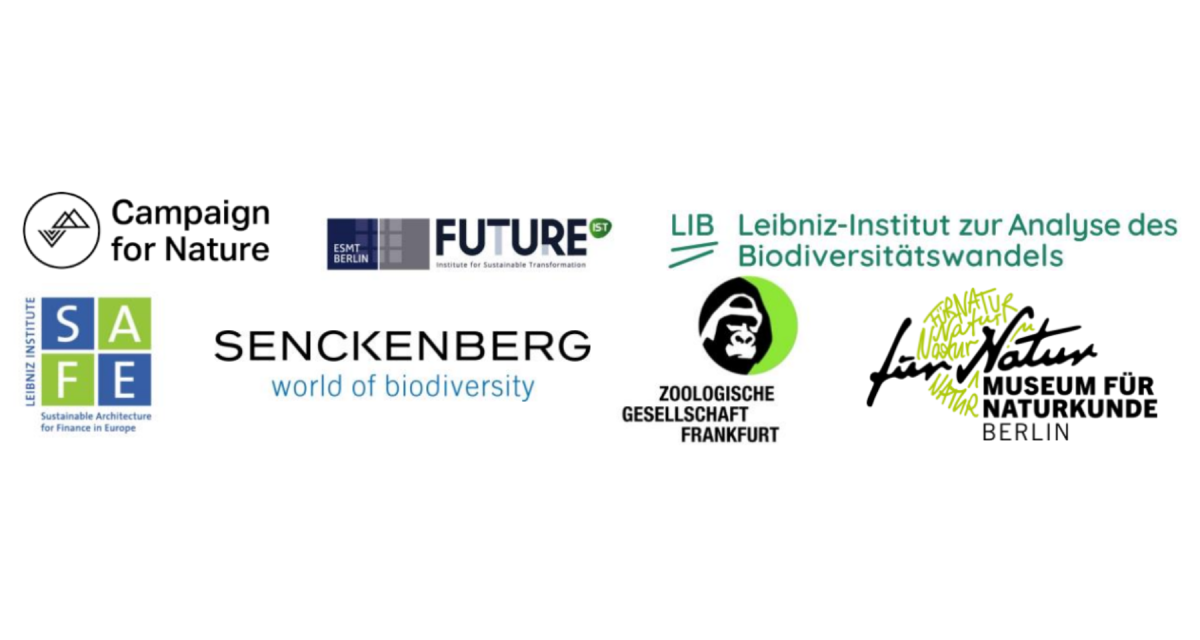Frankfurt Declaration: Together for Biological Diversity

Biodiversity – the variety of life from genes to species to habitat diversity – provides humans with vital ecosystem services. Nature supplies food and raw materials; regulates the climate, material cycles, and erosion; and offers space for recreation and education. The total economic value of these “services” amounts to around 170 to 190 trillion US dollars per year. The current economic model uses these services of nature without payment – resulting in the overexploitation and destruction of natural resources and thus our most important basis of life.
“The climate crisis has been studied in far greater depth scientifically than the crisis of biodiversity loss. There is an urgent need to catch up in this regard,” says Prof. Jörg Rocholl, president of the international business school ESMT Berlin. “How can we put a price on biodiversity loss, the way we already do on CO2 emissions? To date, there is no consensus for such a valuation that would motivate companies to take more decisive action. We need interdisciplinary cooperation between natural scientists and economists to develop the proper and significant protection concepts and to assign indicators to the overexploitation of the environment.”
A broad alliance of German scientific and non-governmental organizations has therefore undertaken to create the conditions required for nature-positive corporate action. In the “Frankfurt Declaration,” which was published today, the alliance calls on science, politics, business, and the public to join forces and envisions Germany in a pioneering role in this endeavor. As the world’s fourth-largest economy, Germany has an enormous “biodiversity footprint”: the global value chains of German companies have a considerable impact on nature and often contribute to its destruction. Moreover, there is hardly a country with a greater wealth of scientific knowledge, comprehensive biodiversity data, and ambitious initiatives for global nature conservation, say the researchers in their declaration.
“We are in desperate need of a trend reversal,” says Dr. Christof Schenck, managing director of the Frankfurt Zoological Society and winner of the German Environmental Award 2022. “After the sobering results of the World Climate Summit in Sharm-el-Sheikh, which has just ended, this applies all the more to the World Summit on Nature in Montreal. What is needed is a binding global agreement of historic proportions to protect nature. It must define the framework for stopping the loss of biodiversity, for managing with rather than against nature, and for restoring the damaged environment.”
The alliance expects mandatory biodiversity reporting by companies as a concrete outcome of the conference. Policymakers must ensure that companies and financial institutions measure their impact and dependence on biodiversity. In addition, they should regularly issue reports on how negative impacts are being reduced and positive effects are facilitated along value chains. Moreover, the scientists call for a level playing field for companies in the form of standardized, science-based sustainability regulations regarding biodiversity. According to the “Frankfurt Declaration,” this should create incentives and safeguards and prevent “greenwashing.” Further points made by the alliance include deforestation-free supply chains and the inclusion of the topic of biodiversity in the German government’s innovation agenda.
“All environmentally harmful subsidies must be eliminated by 2030, at the latest. Existing financial incentives, taxes, and subsidies must be reformed and redirected in such a way that public and private financial flows are directed towards nature-friendly activities. This creates a level playing field for the economy and avoids market distortions. We can identify these necessary rededications based on science and with concrete recommendations,” according to the directors general of the three Leibniz Natural History Museums: Prof. Dr. Klement Tockner (Senckenberg Gesellschaft für Naturforschung), Prof. Dr. Johannes Vogel (Natural History Museum Berlin), and Prof. Dr. Bernhard Misof (Leibniz Institute for the Analysis of Biodiversity Change).
The researchers also offer their expertise in other areas. “We will provide substantial support for the development of suitable and uniform biodiversity metrics. Together, we will also advance the development of a global biodiversity dataset and make it publicly accessible. To this end, we are combining the wealth of data from international biodiversity research, applying existing tools to capture biodiversity in real time, and rapidly developing them further, aiming for a ‘digital twin of the living world.’ At the same time, a best practice platform for nature-positive action sets the necessary benchmarks for comparison. But one thing is clear: If we do not fundamentally change towards a nature-positive economy now, the Anthropocene – the age of humans – will become the shortest epoch in the history of the Earth. And that is what we must prevent; that is what we are emphatically working for together,” says Tockner.
In addition to the persons mentioned above, the initial signatories of the “Frankfurt Declaration” also include Prof. Dr. Jan Pieter Krahnen (Leibniz Institute for Financial Research SAFE), Prof. Dr. Katrin Böhning-Gaese (Senckenberg Biodiversity and Climate Research Center Frankfurt and winner of the 2021 Environmental Award), Prof. Dr. Josef Settele (Helmholtz-Centre for Environmental Research, German Centre for Integrative Biodiversity Research), Prof. Dr. Volker Mosbrugger (BMBF Initiative for Biodiversity Conservation, Polytechnische Gesellschaft e.V.), Dr. Georg Schwede (Campaign for Nature), and Dr. Tobias Raffel (FUTURE Institute for Sustainable Transformation).
Link to the Frankfurt Declaration and the list of supporters: https://frankfurter-erklaerung.eu/
Link to video statements by personalities accompanying the initiative, including Astrid Teckentrup (CEO DACH, Procter & Gamble), Alexander Birken (CEO, Otto Group), Stefan Wintels (CEO, KfW), Johan Rockström (Director, PIK), Nina Ruge (UN Decade on Ecosystem Restoration): https://frankfurter-erklaerung.eu/videostatements
Please note that the press release was published under the joint venture of what used to be FUTURE Institute, which has now been restructured and is known as the ESMT Institute for Sustainable Transformation.
About Senckenberg Gesellschaft für Naturforschung
The Senckenberg Gesellschaft für Naturforschung (Senckenberg Nature Research Society), a member of the Leibniz Association, has studied the “Earth System” on a global scale for over 200 years – in the past, in the present, and with predictions for the future. We conduct integrative “geobiodiversity research” with the goal of understanding nature with its infinite diversity, in order to preserve it for future generations and use it in a sustainable fashion. In addition, Senckenberg presents its research results in a variety of ways, first and foremost in its three natural history museums in Frankfurt, Görlitz, and Dresden. The Senckenberg natural history museums are places of learning and wonder and serve as open platforms for a democratic dialog – inclusive, participative, and international. For additional information, visit www.senckenberg.de.
About ESMT Berlin
Quick links
